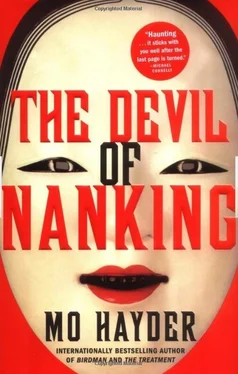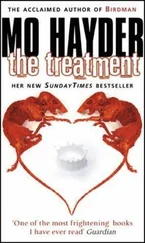It was bitterly cold in the house, and immediately I could feel the strained atmosphere. When Liu came to the hallway to greet me I knew that something had happened.
‘What is it?’
He didn’t answer. He beckoned me out of the hall and into a small cluttered room where his son sat in abject misery, his head hanging low. He wore a Sun Yat-sen military-style jacket, torn and ripped and hanging on his frail shoulders, making him look more dishevelled and pitifully stained than ever. On the table in front of him lay a filthy sack, what appeared to be buckwheat spilling out of it.
‘He’s been out all night,’ said Liu. ‘Brought back food.’
I stared hungrily at it. ‘Master Liu, I commend your bravery. This is indeed news. Good, good news.’
Liu’s wife brought buckwheat dumplings – some wrapped in muslin and crammed into a bamboo steaming basket for me to take to Shujin, and another dish for me to eat now. She put them down in front of me without a word or a look, and left the room. I ate as fast as I could, standing up, cramming them into my mouth and looking blankly at the ceiling as I chewed. Liu and his son averted their eyes out of decency. But, in spite of the food, I couldn’t avoid noticing the atmosphere between them.
‘What?’ I said, through a mouthful. ‘What is it?’
Liu touched the boy’s foot with his toes. ‘Tell him what’s happened.’
The boy looked up at me. His face was white and serious. It was as if overnight he had lost his childhood. ‘I’ve been out,’ he whispered.
‘Yes?’
He lifted his chin in the direction of the street. ‘Out there. All night I’ve been walking in the city. I’ve spoken to people.’
I swallowed the last of the dumpling, feeling it stick in my throat. ‘And you’ve come back safely. The streets are safe?’
‘No.’ A sudden tear ran down his face. My heart sank. ‘No. The streets are not safe. The Japanese are devils. The riben guizi.’ He gave his father an anguished look. ‘You told me they would only kill soldiers. Why did you say that?’
‘I believed it. I thought they’d leave us be. I thought we’d be considered refugees.’
‘Refugees.’ He batted the tears away with his sleeve. ‘There’s a place for people they call refugees.’
‘At the university,’ I said. ‘Have you been there?’
‘Not only me. I am not the only one who has been there. The Japanese have been too. They took the “refugees” away. I saw it. They were strung together.’ He jabbed a finger into the soft flesh behind his collarbone. ‘They put a wire through here and strung them together, like – like a necklace. A necklace of people.’
‘You actually saw all of this? At the refugee zone?’
He pushed roughly at his eyes, the tears leaving streaks in the dirt. ‘I’ve seen everything. Everything. And I’ve heard everything.’
‘Tell me,’ I said, sitting down on one of the rickety chairs and looking at him seriously, ‘did you hear screaming? An hour ago. A woman screaming. Did you hear that?’
‘I heard.’
‘Do you know what it was?’
‘Yes.’ He looked at his father, then back at me, anxiously biting his lip. He felt in his pocket and pulled out something to show us. Liu and I both leaned forward. On his palm was a Japanese condom. I took it from him and turned it over in my hand. It bore a picture of a soldier racing forward, bayonet at the ready, the word ‘ Totsugeki ’ written underneath. Charge! Liu and I exchanged looks. His face had become very grey, tension creeping into the skin round his mouth.
‘Rape,’ the boy said. ‘They are raping women.’
Liu glanced at the doorway. His wife was in the back of the house and she couldn’t have heard; nevertheless he put out his foot and kicked closed the door. My heart was thudding dully. When I was thirteen I had no idea what rape was, but this boy used the word matter-of-factly, as if it was an everyday event.
‘Girl hunts,’ he said. ‘It’s the Japanese’s favourite pastime. They take coal trucks from Xiaguan and trawl the villages for women.’ He raised his dirt-smeared face to me. ‘And do you know what else?’
‘No,’ I said faintly. ‘What else?’
‘I’ve seen where the yanwangye lives.’
‘ Yanwangye?’ A little ghost of fear crossed my heart. I glanced instinctively at Liu, who was contemplating his son with a mixture of fear and confusion. Yanwangye. The devil. The greatest of the death lords. The ruler of Buddhist hell. Ordinarily the likes of old Liu and I would roll our eyes at such folk-religion, but something in us has changed over the last few days. Hearing the name whispered in this cold house made us both shiver.
‘What are you talking about,’ said Liu, leaning closer to his son. ‘ Yanwangye? I didn’t teach you such nonsense. Who have you been speaking to?’
‘He’s here,’ whispered the boy, his eyes meeting his father’s. I could see goosebumps on his skin. I glanced up at the windows, locked tight. It was very quiet outside; the falling snow made the light flicker pink and white. ‘The yanwangye has come to Nanking.’ Not taking his eyes from his father’s, he got slowly to his feet. ‘If you don’t believe it then come with me out there.’ He gestured to the door and we both turned and looked at it in silence. ‘I’ll show you where he lives.’
Shi Chongming was surprised to see me. He opened his door with chilly civility and let me into his office. He clicked on a three-bar heater, pulling it nearer to the low, battered sofa that sat under the window, and filled a teapot from the Thermos on his desk. I watched distantly, thinking how odd – the last time we spoke he had put the phone down on me.
‘Well, now,’ he said, when I was seated. He was looking at me curiously because I had come straight from the temple and my skirt was still wet from the grass. ‘Does this imply we are on speaking terms again?’
I didn’t answer. I pulled off my coat, my gloves and my hat and bunched them all up on my knees.
‘Have you some news? Are you here to tell me that you’ve seen Fuyuki?’
‘No.’
‘Then you’ve remembered something? Something about the glass box you saw?’
‘No.’
‘Is it possible that Fuyuki is preserving something in the box? Because that’s how it sounded when you described it.’
‘Did it?’
‘Yes. Whatever it is that Mr Fuyuki is drinking, he believes it’s saving him from death.’ Shi Chongming swirled the teapot. ‘He’d have to be careful how much he took. Especially if it was dangerous or difficult to replace his supply. From what I suspect, I am sure the tank is how he preserves it.’ He poured the tea, his eyes not leaving my face, studying me for a reaction. ‘Tell me more about the impression you had.’
I shook my head. I was too numb to pretend. I took the cup he gave me and held it tightly, in both hands, looking down through the steaming water at the greyish streak of sediment in the bottom. A long, awkward silence filled the room, until eventually I put down the cup.
‘In China,’ I said, although I knew it wasn’t what he wanted to hear, ‘what happens if someone isn’t buried properly? What happens to their spirit?’
He had been about to sit down with his own cup, but my words stopped him. He checked himself, bent, half in, half out of the chair, digesting my question. When at last he spoke his voice had changed: ‘What an odd thing to ask. What made you think of that?’
‘What happens to their spirit?’
‘What happens to their spirit?’ He sat, taking some time to settle, straightening his tunic, moving his cup back and forward. At length he rubbed his mouth and looked up at me. There was a blush of red round his nostrils. ‘The unburied? In China? Let me see. The simple answer is that we believe a ghost is produced. A mischievous spirit is released to come back and cause trouble. And so we bury our dead carefully. We give them money to pass into the next world. It was…’ He cleared his throat, tapping his fingers distractedly. ‘It was what always worried me about Nanking. I was always afraid of the thousands of mischievous spirits left in Nanking.’
Читать дальше












